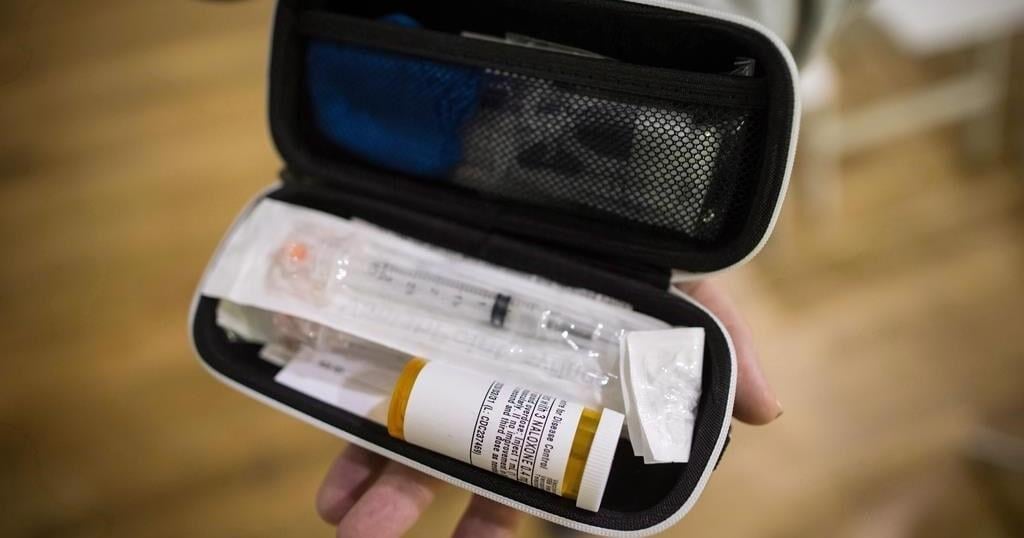FREDERICTON – As they both campaign for re-election, the premiers of British Columbia and New Brunswick appear to agree on one controversial issue: involuntary care for those with severe drug addictions.
Earlier this month, B.C. NDP Leader David Eby committed to providing involuntary care to those struggling with overlapping addictions, mental illness and brain injury concerns. He said the new approach would “provide clarity and ensure that people, including youth, can and should receive care when they are unable to seek it themselves.”
Eby has promised to build low-security facilities for individuals who pose a risk to themselves or others to ensure they receive treatment in a safe environment. His decision came after a report released by Dr. Daniel Vigo, B.C.’s first chief scientific adviser for psychiatry, toxic drugs and concurrent disorders, which made the recommendation.
In New Brunswick, Eby’s promise caught the attention of Progressive Conservative Leader Blaine Higgs, who last week called an election for Oct. 21. Higgs has suggested that he and Eby are on the same page, despite their political pedigrees.
Higgs has said that if his party is re-elected to govern for a third term, the Tories will introduce the Compassionate Intervention Act, which would allow the government to place people with severe drug addiction in treatment without their consent, but not before consulting with their relatives, medical professionals and police.
Dr. Kenneth Fung, a professor with the University of British Columbia’s faculty of medicine, said those receiving involuntary care could be held in secure hospital wards, which can provide a 24-7 safe haven for people suffering from mental illness.
“This is the medical and ethical intention of compassionate care,” he said.
Fung likened involuntary care to retirement homes for senior citizens who can’t look after themselves or nursing homes for those suffering from Alzheimer’s disease.
“The term ‘involuntary care’ has a rather negative social intonation, and … should be replaced by ‘compassionate care,'” he said.
Fung said secure treatment facilities work because patients are offered social support while avoiding drugs and homelessness. “When people with mental illness become victims of drug dealers, their lives become an uncontrollable downward spiral,” he said.
“The voluntary-care system has no effective check to help these victims maintain a voluntary-care existence in society. The failure of the voluntary-care model is evidenced by the horrible situation in the Downtown Eastside of Vancouver and many urban areas.”
B.C’s former chief coroner, Lisa Lapointe, issued a statement Wednesday saying there is no conclusive evidence for the effectiveness of involuntary care for those experiencing substance use disorders.
“It is further acknowledged that such care may, in fact, do more harm than good,” Lapointe said in an opinion piece. “It is concerning that our government is seeking to remove a person’s most basic rights to liberty and security of the person in order to impose care with no evidentiary basis.”
A July 2022 study in the journal “Drug and Alcohol Dependence” found that the risk of dying after discharge from compulsory care for substance abuse is high, especially for older men.
Taryn Grieder, assistant professor at University of Toronto’s psychology department, said involuntary treatment can work for some.
“I think that it is a good idea to force treatment because people who are abusing substances, they don’t often sign themselves up for treatment,” Grieder said.
“The idea is that when they’re in treatment, they’re going to develop better coping strategies …. Hopefully, if they’re forced to complete the program, then more people will gain the necessary skills that are needed to remain abstinent.”
New Brunswick Liberal Leader Susan Holt wasn’t available to talk about the issue.
The province’s Green Party leader, David Coon, said the best way to help people withsubstance abuse and mental health disorderswould be to offer them wraparound services to ensure some stability and getting them “mental health assistance to deal with underlying trauma.”
New Brunswick’s Progressive Conservative Party issued a statement saying voters “have a choice this election between compassionate intervention or increasing drug injection sites in communities, (and) a choice between helping people get free from addiction or keeping people addicted.”
The only safe-injection site in New Brunswick is in Moncton.
“British Columbia has perhaps the most intense recent experience with drug injection sites and they have moved to compassionate intervention,” the Tory statement said.
This report by The Canadian Press was first published Sept. 26, 2024.
